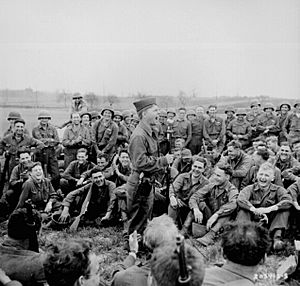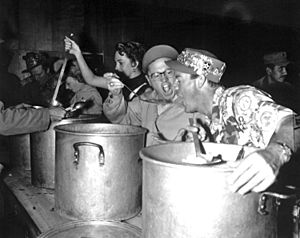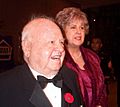Mickey Rooney facts for kids
Quick facts for kids
Mickey Rooney
|
|
|---|---|
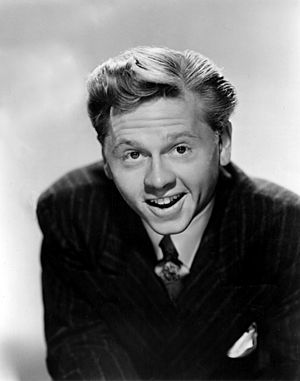
Rooney in 1945
|
|
| Born |
Joseph Yule Jr.
September 23, 1920 New York City, U.S.
|
| Died | April 6, 2014 (aged 93) Los Angeles, California, U.S.
|
| Resting place | Hollywood Forever Cemetery, Los Angeles |
| Other names | Mickey Maguire |
| Occupation |
|
| Years active | 1922–2014 |
|
Notable work
|
Full list |
| Spouse(s) |
|
| Children | 9, including Tim, Michael, Teddy and Mickey Jr. |
| Parent(s) |
|
Mickey Rooney (born Joseph Yule Jr.; September 23, 1920 – April 6, 2014) was a famous American actor. He had an amazing career that lasted for 88 years, appearing in over 300 films. He was one of the last actors from the silent film era.
From 1939 to 1941, Mickey Rooney was the most popular movie star. He was also one of the highest-paid actors of his time. He became very famous for playing Andy Hardy in a series of 16 films. These movies showed a typical American family in the 1930s and 1940s.
Mickey Rooney was a very talented actor. He could play many different kinds of characters. Later in his career, he became known as a celebrated character actor. Famous actor Laurence Olivier once called Rooney "the best there has ever been." Director Clarence Brown said Rooney was "the closest thing to a genius." Rooney won a Golden Globe Award and an Emmy Award in 1982 for his role in the TV movie Bill. He also received a special Academy Honorary Award in 1982 for his long career.
Rooney started acting on stage as a child. He made his first movie at age 6. He starred as "Mickey" in 78 short films called "Mickey McGuire" when he was 7 to 13 years old. At 14, he played Puck in the movie A Midsummer Night's Dream. When he was 16, he began playing Andy Hardy. At 19, he was nominated for an Academy Award for his role in Babes in Arms. He was one of the youngest actors ever nominated for this award.
During World War II, Rooney joined the military. He spent almost two years entertaining over two million troops. He even performed in combat zones and received a Bronze Star Medal. After the war, he found it harder to get leading roles. However, he still appeared in many popular films. These included Pete's Dragon (1977) and The Black Stallion (1979). In the early 1980s, he returned to Broadway in the musical Sugar Babies. He also made hundreds of appearances on TV shows.
Contents
Early Life and First Roles
Mickey Rooney was born Joseph Yule, Jr., in Brooklyn, New York City, on September 23, 1920. His mother was a former dancer, and his father was a stage performer from Scotland. They lived in Brooklyn. Rooney later said he started performing with his parents when he was only 17 months old. He even wore a tiny tuxedo!
When Rooney was four, his parents separated. He and his mother moved to Hollywood. He made his first movie at age six in 1926. He got small parts in films like The Beast of the City (1932). This allowed him to work with big stars like Clark Gable and John Wayne. He went to the Hollywood Professional School.
Becoming a Star
The Mickey McGuire Films
Rooney's mother saw an ad for a child actor to play "Mickey McGuire" in a series of short films. Rooney got the part and played "Mickey" in 78 films from 1927 to 1936. His first starring role was in Mickey's Circus (1927). During this time, he also briefly voiced Oswald the Lucky Rabbit.
At age 14, he played Puck in the movie A Midsummer Night's Dream (1935). Critics loved his performance. Rooney then joined MGM studios. There, he became good friends with Judy Garland. They made many musicals together, which made them both very famous.
The Andy Hardy Movies and Hollywood Fame
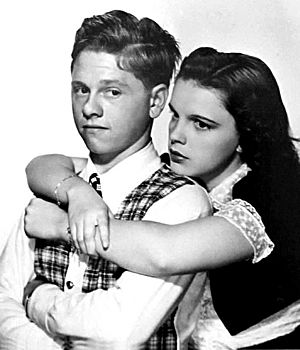
In 1937, Rooney was chosen to play Andy Hardy in A Family Affair. This movie was meant to be a small film. Rooney played the funny son of Judge James K. Hardy. The movie was a big hit! This led to 13 more Andy Hardy films between 1937 and 1946, and one more in 1958.
The Andy Hardy films were made for the whole family. Rooney's character was a typical, energetic teenager. He soon became the main star of the movies. These films showed a comforting picture of small-town America. Rooney helped create a lasting image of what many parents hoped their teenagers would be like.
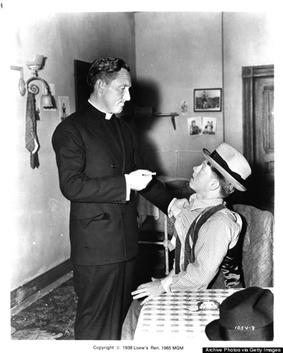
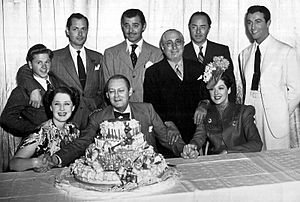
In 1937, Rooney made his first movie with Judy Garland, Thoroughbreds Don't Cry. They became close friends and a very successful singing and dancing team. Audiences loved watching them together. They appeared in several Andy Hardy films and successful musicals like Babes in Arms (1939). For his role in Babes in Arms, 19-year-old Mickey Rooney was nominated for an Academy Award.
Rooney's breakthrough as a serious actor came in the 1938 film Boys Town. He starred with Spencer Tracy, who played Father Flanagan. Father Flanagan ran a home for troubled boys. Rooney and Deanna Durbin received a special Academy Juvenile Award in 1939. This award was for showing the "spirit and personification of youth" on screen.
Mickey Rooney was the biggest box-office star in 1939, 1940, and 1941. Laurence Olivier even called him "the greatest actor of them all." Rooney also worked with many famous female stars. These included Elizabeth Taylor in National Velvet (1944) and Audrey Hepburn in Breakfast at Tiffany's (1961).
Military Service and Later Career
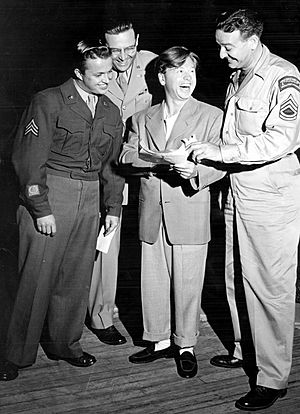
In June 1944, Rooney joined the United States Army. He served for over 21 months, entertaining troops in America and Europe. He was a radio personality and performed in combat zones. He received the Bronze Star Medal for his service.
After the war, Rooney's career changed. He was too old for teenage roles but was shorter than most leading men. He appeared in the film Words and Music in 1948. This was his last film with Judy Garland. He also had a radio show and reprised his role as Andy Hardy on the radio.
Rooney faced financial challenges during this period. He kept working in films and on TV. In 1954, he starred in his own TV series, The Mickey Rooney Show. He also directed a film called My True Story in 1951. In 1957, he starred in the TV drama The Comedian.
In the 1960s, Rooney continued to act in movies. He appeared in Requiem for a Heavyweight (1962) and It's a Mad, Mad, Mad, Mad World (1963). He played a Japanese character, Mr. Yunioshi, in the 1961 film Breakfast at Tiffany's. This role later received criticism. Rooney said he would not have taken the role if he knew it would offend people.
In 1979, Francis Ford Coppola asked Rooney to play a jockey in The Black Stallion. Rooney had played jockeys before, so he was perfect for the role. The film was a big success and earned Rooney another Academy Award nomination. In 1983, the Academy of Motion Picture Arts and Sciences gave Rooney an Academy Honorary Award for his amazing career.
Later Roles and Broadway Comeback
Television Roles
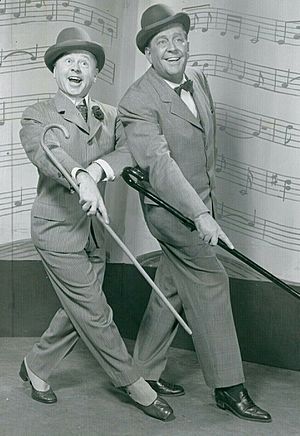
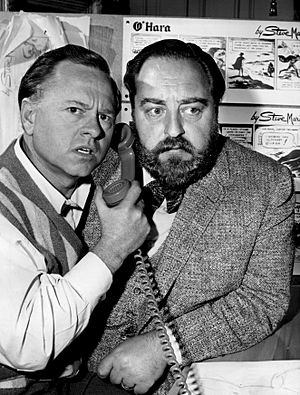
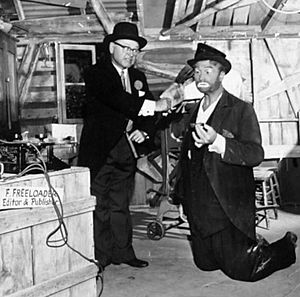
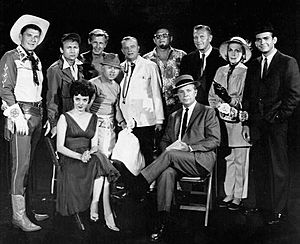
Rooney made many guest appearances on TV shows for almost 60 years. He was on shows like Wagon Train, The Love Boat, and Murder, She Wrote. In 1963, he gave a powerful solo performance in an episode of The Twilight Zone. In 1964, he launched another TV show called Mickey. His son Tim Rooney played his character's son on the show.
In 1981, Rooney won a Golden Globe Award and an Emmy Award for his role in the TV movie Bill. He played a mentally challenged man trying to live on his own. He played the role again in Bill: On His Own (1983).
Rooney also did voice acting. He was the voice of Santa Claus in several animated Christmas TV specials. These included Santa Claus Is Comin' to Town (1970) and The Year Without a Santa Claus (1974). In 1995, he appeared as himself on The Simpsons.
Later, Rooney starred in The Adventures of the Black Stallion TV series. He played Henry Dailey, a role he had played in the movie. The show was popular around the world.
Broadway Shows
A big moment in Rooney's career came in 1979. He made his Broadway debut in the musical Sugar Babies. He starred with Ann Miller. The show was a tribute to the old burlesque shows. It opened to great reviews. Rooney and Miller performed the show over 1,200 times in New York. They then toured with it for five years, even in London. Rooney was nominated for a Tony Award for his performance.
After Sugar Babies, he toured in other stage shows. In the 1990s, he returned to Broadway in Will Rogers Follies. He also played The Wizard in a stage production of The Wizard of Oz.
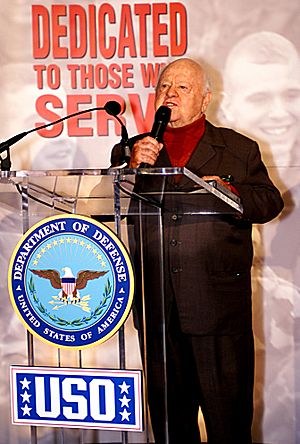
Final Years
Rooney wrote a book about his life called Life is too Short in 1991. He also wrote a novel in 1994. In 2000, he starred in the Disney Channel movie Phantom of the Megaplex.
Despite earning millions of dollars, Rooney faced financial difficulties later in his life. He kept performing on stage and in movies. In 2005, he and his wife Jan toured with a musical show called Let's Put on a Show.
In 2006, Rooney played Gus in Night at the Museum. He returned for the sequel Night at the Museum: Battle of the Smithsonian in 2009. In 2011, he had a small role in The Muppets. In 2014, just before he passed away, he played Gus again in Night at the Museum: Secret of the Tomb. The director said Rooney was "energetic and so pleased to be there."
Personal Life
Mickey Rooney was married eight times. He had nine children and two stepchildren. He also had many grandchildren and great-grandchildren. In the late 1970s, Rooney became a Christian.
His last marriage was to Jan Chamberlin in 1978. Their marriage lasted until his death in 2014, though they had separated in 2012.
Death
Mickey Rooney passed away from natural causes on April 6, 2014, at age 93. He was buried at Hollywood Forever Cemetery in Los Angeles.
Legacy
Mickey Rooney was one of the last actors from the silent film era. His acting career lasted an incredible 88 years. During his most popular years, from the late 1930s to the early 1940s, he was one of the top movie stars in the United States. In 1939, he was the number one box-office star.
He made 43 films between the ages of 15 and 25. His role as Andy Hardy became one of "Hollywood's best-loved characters." Actress Margaret O'Brien said, "There was nothing he couldn't do." MGM studio boss Louis B. Mayer saw Rooney as the perfect image of a friendly American boy.
By the end of the 1940s, Rooney's career slowed down. But he kept working and growing as an actor. Films like Requiem for a Heavyweight (1962) and The Black Stallion (1979) helped bring him back into the spotlight. In the early 1980s, his return to Broadway in Sugar Babies made him a top star once again.
Images for kids
See also
 In Spanish: Mickey Rooney para niños
In Spanish: Mickey Rooney para niños
 | Emma Amos |
 | Edward Mitchell Bannister |
 | Larry D. Alexander |
 | Ernie Barnes |


